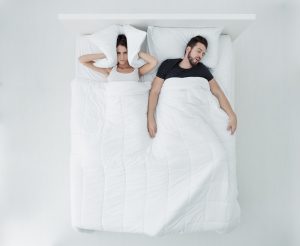 Obstructive sleep apnea is a condition that affects many of Americans, but not everyone is familiar with the condition. The symptom most associated with obstructive sleep apnea is snoring. Snoring stands out because it’s disruptive to others who may have to hear the noise. However, sleep apnea is much more than just a snore. The condition has serious health ramifications, so if you suffer from sleep apnea, you want to know about it! What can you do to address obstructive sleep apnea? It’s time to find out in today’s blog.
Obstructive sleep apnea is a condition that affects many of Americans, but not everyone is familiar with the condition. The symptom most associated with obstructive sleep apnea is snoring. Snoring stands out because it’s disruptive to others who may have to hear the noise. However, sleep apnea is much more than just a snore. The condition has serious health ramifications, so if you suffer from sleep apnea, you want to know about it! What can you do to address obstructive sleep apnea? It’s time to find out in today’s blog.
The Causes and Symptoms of Obstructive Sleep Apnea
Obstructive sleep apnea is caused by your oral tissues. When you sleep, these tissues can become overly relaxed. In some cases, the tissues are abnormally large to begin with. In both cases, this oral tissue (often the tongue) creates a blockage in your airways. That means that air can’t comfortably get to your lungs. You stop breathing, causing you to wake up. However, you may not even fully regain consciousness and realize that an episode has happened. These bouts of apnea can happen dozens of times throughout the night, robbing you of sleep. Snoring, waking throughout the night, and chronic exhaustion are all symptoms of this condition.
The Health Risks Associated with Obstructive Sleep Apnea
Sleep apnea can be tough to diagnose, since you may not even realize that you have the condition. If your sleep apnea goes untreated for a long time, you may notice health complications as a result. High blood pressure — which increases your risk for a heart attack or stroke — is a common symptom of obstructive sleep apnea. Depression, headaches, and general fatigue are all issues that are sparked and compounded by a lack of sleep. Sleep apnea can even cause poor liver function for some patients.
How to Treat Your Obstructive Sleep Apnea
If you do have sleep apnea, you’ll want to treat the condition as soon as possible. You may have seen picture or videos of complicated breathing machines used during sleep. These machines add cost, complication, and noise for any partners sleeping alongside them. Often times, your dentist can actually craft an oral appliance for you to help with obstructive sleep apnea. The oral appliance, which functions like a mouthguard, moves the jaw slightly to allow air to flow to your lungs.
Elm Creek Dental Offers Oral Appliances for OSA
If you suffer from chronic fatigue and you have a snoring problem, obstructive sleep apnea could be the cause. Talk to the team at Elm Creek Dental about the condition. Your dentist can arrange a sleep study to determine whether or not you have the condition, and then fit you for an oral appliance to help you breathe throughout the night. To schedule an appointment for a consultation, contact Elm Creek Dental in Maple Grove, MN at 763-416-0606.








